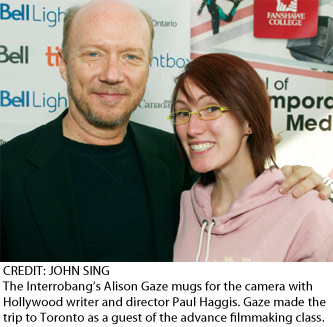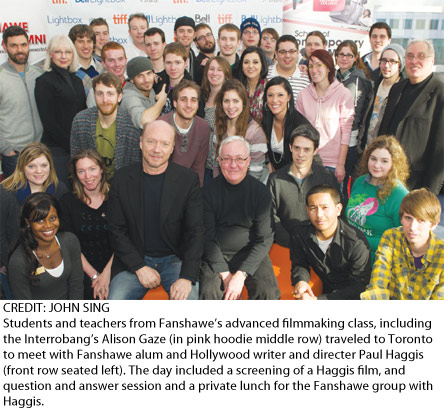Paul Haggis hosts Fanshawe's advanced filmmaking students

A film screening, a question and answer session and a private lunch with Oscar winner Paul Haggis isn't exactly an everyday occurrence for Fanshawe's advanced filmmaking class. On February 10 the advanced filmmaking class, along with a handful of teachers and other school representatives, boarded a bus bound for Toronto. Their destination was the TIFF Bell Lightbox theatre. The itinerary for the day included a screening of In The Valley of Elah, followed by Q and A with Haggis and then a private lunch with Haggis. After a slightly late arrival at the beautiful Bell Lightbox, which Haggis promptly called out during the Q and A, the screening began.
The movie Haggis chose to screen was his 2007 feature In The Valley of Elah, which tells the story of a murdered soldier who had recently returned home from fighting in Iraq. The film stars Tommy Lee Jones as the soldier's father, and Charlize Theron as the detective in charge of the murder investigation. The film is exceptionally thought provoking, exposing the depths of love and compassion as well as the atrocities the people we love are capable of. The chance to see In The Valley of Elah on a big screen was certainly a rare opportunity, as the film never saw a wide screen release. Immediately after the credits stopped rolling Haggis walked out on stage and began his question and answer period.
The Bell Lightbox theatre is not only a film theatre, it is also a stage theatre equipped with a stage and balcony where the Fanshawe group was graciously seated. Seated in the middle of the stage, Haggis sat with an air of coolness that only people of greatness are able to exude. He began by speaking about the film's meaning.
"We wanted to see if we could make you care about your own boys and girls," he said, reinforcing the often forgotten fact that America and its troops are still actively at war. He also mentioned that instead of making a politically charged film, he simply "wanted to centre on our boys at war." In order to get the project approved by the studio, Haggis had to seek out and secure the film's financing himself, which proved to be an almost daily struggle.
When asked about the message at the film's heart, Haggis offered two explanations: the first that it "is a story about what happens when you send people to a place where they can't be heroes," and also that it was about the soldiers who "go (to Iraq) thinking they're David and quickly realize they're Goliath." This second explanation ties into the film's title, which is a reference to the valley in the fable of David and Goliath.
The questions quickly moved to those surrounding Haggis' Academy Award-winning 2004 film Crash, which Haggis quickly explained as a film on which both "the actors and myself had to work to scale." A low-budget film that necessitated being shot almost entirely indoors due to budgetary restrictions, he was fully committed to it nonetheless. "I just wouldn't leave," Haggis said. "I just never left." Even through an everchanging cast, at various points John Cusack, Eva Mendes and Heath Ledger were all attached, Haggis showed his never-say-die spirit.
Haggis then went on to speak about his experiences in his work in television as well as his struggles to sharpen his writing skills. "I made a good living as a bad writer for a long time," he explained, adding that above all, "writing is the hardest."
Following the Q and A session, which was open to various film and television programs in the area, the Fanshawe crew headed upstairs to a private room where Haggis joined them for an intimate lunch and an additional private Q and A. Allowing an extraordinary opportunity for the Fanshawe AFM students to meet Haggis and personally question him, Haggis was gracious and welcoming every minute.
With some personal advice from the man who all Fanshawe film students are inevitably held standard to, along with some trade secrets spilled, the day ended on a high note. It was an experience that everyone involved will not soon forget, and one that the class will be eternally grateful for. In the end, Paul's great advice rings true for us all: "Just never stop."














